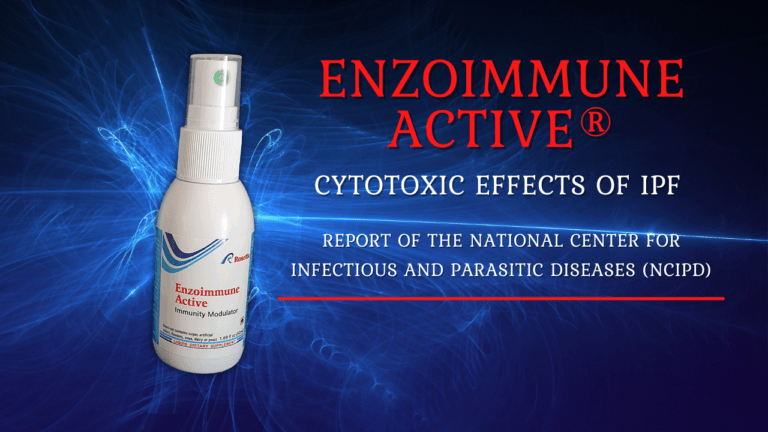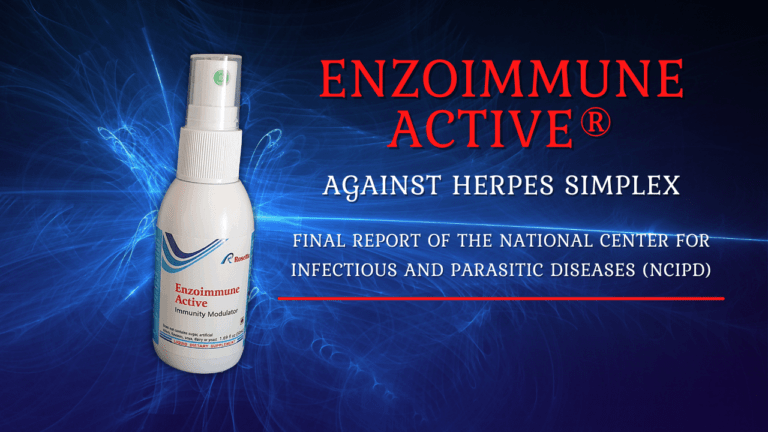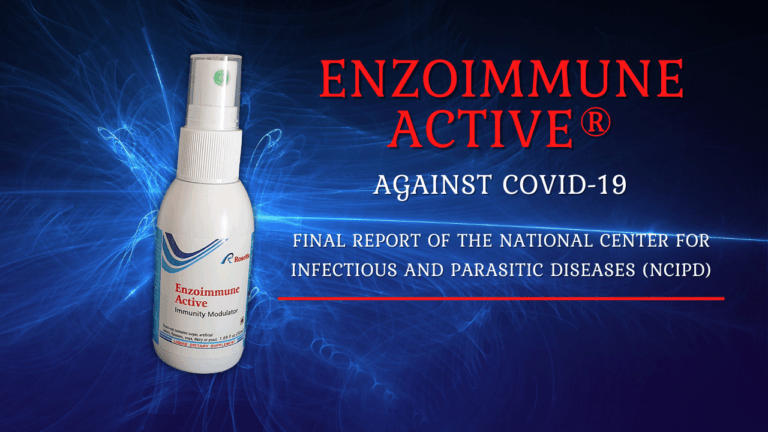Emzoimmune Active Regimen (long term)
Information about the long term regimen of Enzoimmune Active If you have any questions or remarks, please, refer to our contact team.
Information about the long term regimen of Enzoimmune Active If you have any questions or remarks, please, refer to our contact team.



The active substance is Inactivated Pepsin Fragment (IPF) derived from pepsin from mucosa (CAS № 9001-75-6) and the method of its extraction and application is patented in the USA as follows: US Patent № 8,309,072 – Irreversible inactivated pepsinogen fragment for modulating immune function. IPF is a complex platform that could be used alone or as a concomitant therapy for a variety of diseases. The substance is made from standardized, purified and lyophilized pepsin containing a polypeptide chain of 327 amino acid residues and one phosphoric acid residue. Using a patented method, a peptide chain of 36 amino acids – (IPF) is isolated, which is involved in a series of immune responses.
Our product has zero toxicity and can be used as an adjunct therapy for:
Viral diseases: respiratory viruses such as SARS-CoV-2 (Covid-19), herpes infections, viral hepatitides, cytomegaloviral infections, and others. Non-specific lower respiratory infections such as pneumonia, chronic bronchitis, laryngitis, chronic obstructive pulmonary disease. Complex therapy for infectious-inflammatory diseases, opportunistic infections, and more. Supporting and balancing the immune system’s function after flu and viral infections. Several autoimmune diseases such as psoriasis, rheumatoid arthritis, cholecystopancreatitis, bronchoobstructive syndrome. As an auxiliary agent in the complex therapy of HIV-positive individuals and people with oncological diseases.
The active substance of the food supplement has been registered for use in the USA with FDA (NDI reg. № 1083). Enzoimunne Active is a registered trade mark of Rosetta Lifecare Bulgaria LTD and is produced under license in Bulgaria (EU) under reg. № 5293/903. This bio-product has shown low toxicity and is well accepted by the body system. Our immunomodulator is a dietary supplement that acts favorably on the immune system by enhancing its ability to fight infections, supporting the formation of antibodies, and contributing to the body’s antioxidant defense. It has a direct antiviral effect, limiting viral replication and reducing the viral load. It is highly effective in alleviating autoimmune diseases such as psoriasis and asthma, but also other complicated medical conditions – as a helping part of more complex therapy.
The active ingredient (Inactived Pepsin Fragment) is aimed at balancing and enhancing the efficiency of your immune system, as well as preventing infectious conditions in the body caused by various pathogens.
Backed by extensive research, EnzoImmune Max has demonstrated efficacy in enhancing immune function. Regular use can contribute to a more resilient and responsive immune system. Quality Assurance: Manufactured under strict quality control standards, EnzoImmune Max prioritizes purity and potency. Each batch undergoes rigorous testing to ensure you receive a premium product.
Viral diseases: viral hepatitis, cytomegalovirus and herpes infections.
In complex therapy of HIV positive patients.
Oncological diseases and heavy ongoing related treatments.
Complex therapy of infectious-inflammatory diseases, opportunistic infections and related conditions.
Non-specific pulmonary infections such as pneumonia, chronic obstructive pulmonary disease, chronic bronchitis, laryngitis, laryngotracheitis.
Balancing the work of the immune system after influenza infections, corona viruses infections, including COVID-19.
Some autoimmune diseases such as rheumatoid arthritis, psoriasis, cholecystopancreatitis, bronchial obstructive syndrome.
Prevention of various infectious conditions.
IPF binds to viral (or other pathogenic) antigens, forming a new antigen complex with them, while blocking their binding to immune cells. An immune response is triggered by modulating the equilibrium between humoral and cellular immune responses by restoring the balance of Th1 and Th2 subunits. IPF also binds to specific tumor antigens, making them recognizable to the immune system. Attached peptide chains to tumor antigens form super antigens that increase the production of antibodies against tumor cells and induce a specific T-lymphocyte response against tumor cells. An increase in CD4 + and an improvement in CD4 + / CD8 + T lymphocyte ratio were observed. Through its mechanism of action, IPF creates non-specific immunity over time.
Our immunity supplement has beneficial effect on your immunity, increasing its ability to fight infections. This is because our product is promoting the formation of antibodies and contributing to the body’s antioxidant defenses. Hence, scientifically proven direct antiviral action by limiting viral replication and reducing viral load.
Do not exceed the recommended daily dose of the immunity supplement. Do not use as a substitute for a varied diet. No drug interactions have been recorded. Since it supports human immunity defences, EnzoImmune Max may be combined with anti-inflammatory agents, chemotherapy, antiviral, antibacterial and antimycotic therapies.
For application of Enzoimmune Active Oral Spray – liquid dietary supplement. WARNING: Do not use together with immunosuppressants.
Inactivated Pepsin fragment (IPF), US patent № 8,309,072; USA – FDA reg. № 1083 – 4,5mg / ml.
Sodium chloride, Sodium acetate, Sodium citrate, Ammonium sulfate, Sodium benzoate, Potassium sorbate, Distilled water.
3 ml – 3 x 8-9 sprays or 2 x 9-10 drops (under the tongue), slight overdose does not have negative effect.
Transparent, colorless or slightly yellowish liquid with specigic organic taste.
50 ml oral spray (applied under the tongue).
It has a beneficial effect on the immune system, enhancing its ability to fight infections, promoting antibody production and promoting the body’s antioxidant defenses. Helps support liver function and keep cholesterol within normal limits.
Adults and children over 14 years of age, to modulate the immune system. The initial stage of absorption begins in the oral cavity after use. The method of administration of the substance is orally, 3 ml per day (3 x 8-9 sprays or 2 x 9-10 drops under the tongue) for three consecutive days per week for 5 weeks. A break of 1 week is recommended, after which the course is repeated 2 more times. Intake of food or liquids for 30 minutes after use is not recommended.
Not established, but hypersensitivity and allergic reactions may occur in very rare occasions Such had not been reported yet.
Consult with your medical doctor.
Not established. Individual intolerance is possible, but not yet observed by clients. Does not affect driving or use of machines.
Do not exceed the recommended daily dose. Do not use as a substitute for a varied diet.
No drug interactions have been reported. As it aids the immune system, EnzoImmune Active Oral Spray can be combined with anti-inflammatory agents, chemotherapies, antiviral, antibacterial and antimycotic therapies and more. Do not use together with immunosuppressants.
24 months from production date. Store in dark place, away from sunlight, at room temperature. Keep away from children. Manifactured: in EU under license of Zhabilov Trust, USA for Rosetta Lifecare Bulgaria LTD, 8B Bialo Pole St, 1618 Sofia, Bulgaria, tel: + 359 89 444 03 60, email: rosettabg@abv.bg.
pH of suspension
6.6 – 6.8
pH meter, USP method
IPF
4.00 – 8.00 mg / mL of protein
Micro Keldahl method
Bacterial endotoxins
less or equal to 28 EU/mg of IPF
USP 24 <85>Bacterial Endotoxin Test
Sterility
Sterile
USP 24 <71>Membrane Filtration
Container closure integrity
Seal and stopper are intact
Visual inspection